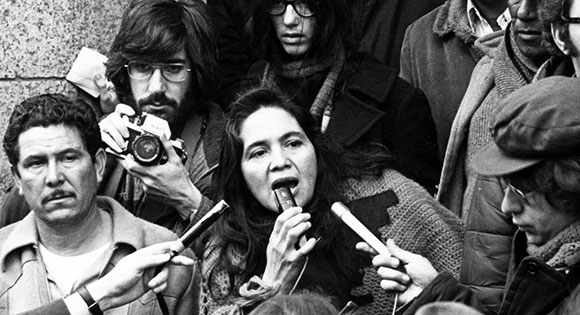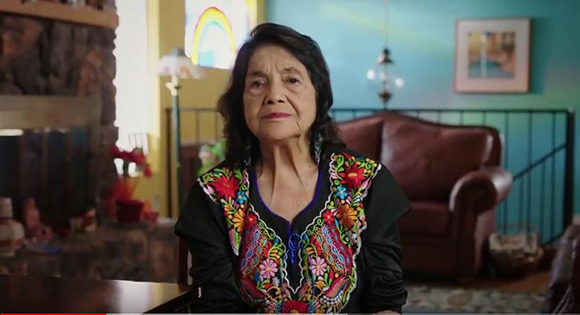"We must use our lives to make the world a better place to live, not just to acquire things. That is what we are put on the earth for."
— Dolores Huerta
Dolores Herata grew up the daughter of a farm worker and found her true calling as a labor leader and civil rights activist. For more than 60 years, she has made sacrifices and worked very hard to make the world a better place. This compelling documentary directed by Peter Bratt celebrates her disciple, energy, and commitment which have inspired so many people and made her an admired role model in the Latina community.
"Every single day we sit down to eat breakfast, lunch, and dinner, and at our table we have food that was planted, picked, or harvested by a farm worker. Why is it that the people who do the most sacred work in our nation are the most oppressed, the most exploited?"
— Dolores Huerta
Huerta was a co-founder of the National Farmworkers Association, which became the United Farm Workers, with the much praised Cesar Chavez. Yet her important role has often been ignored by history. With skills as both an organizer and a lobbyist, she helped get the young organization needed attention. She was responsible for bringing women into the union and for reinvigorating the movement again and again with her creative energy and nonviolent protest.

Her main goal was to improve the working conditions of workers on the farms in central and northern California. When other actions failed to bring their bosses, the growers, to the bargaining table, Huerta helped to organize a nationwide boycott of grapes. She went to New York where she discovered many new allies among the women's movement, the black and Puerto Rican communities, and students. The grape boycott was a success and Huerta negotiated the contracts between the farm workers and wine companies that resulted in a three-year collective bargaining agreement with the UFW in 1970.
"People would say 'Who is a leader?' A leader is a person that does the work. It's very simple. It's a personal choice for people who choose to put in their time and their commitment to do the work. It's a personal choice."
— Dolores Huerta
Over the years, this busy activist spent much of her time away from her eleven children, and in interviews for the documentary, many of them admit their childhood anger and sense of loss. Yet they have all joined her cause, working in different ways to carry on her legacy.

Huerta has long had and still has many admirers. After winning the California Democratic presidential primary in 1968, Robert F. Kennedy spoke of his admiration of Huerta and thanked the farm workers for their help during his campaign; tragically, he was killed only minutes later. In the film she is praised by Angela Davis for her dedication and by Gloria Steinem for her advocacy of feminism.
"The thing about nonviolence is that it spreads. When you get people to participate in nonviolent action — whether it's a fast, a march, a boycott, or a picket line — people hear you, people see you, people are learning from that action."
— Dolores Huerta
After Cesar Chavez died in 1993, many people, including Huerta, thought that she was the overwhelming choice to head up the United Farm Workers. But she was the only woman on the board, and the men chose Arturo Rodriguez as president instead. Huerta saw this setback as a sign that more work needed to be done to convince women to see themselves as change agents in a world of manifold injustices. At a peaceful protest in San Francisco, she was brutally beaten by a police officer. For this activist, that was just another challenge to keep on keepin' on.
"Every moment is an organizing opportunity, every person a potential activist, every minute a chance to save the world."
— Dolores Huerta
